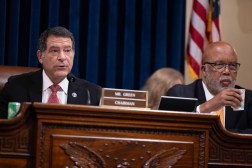Michael Daniel: Cyber workforce goes beyond ‘coders at the keyboard’
While the White House plans to fill thousands of cybersecurity jobs within the federal government this year, the administration is also looking for a host of other professionals — from lawyers to economists to behavioral scientists — to boost agency practices securing digital networks.
Two top White House cybersecurity officials — Cybersecurity Coordinator Michael Daniel and Chief of the Office of Management and Budget’s Cyber and National Security Unit Trevor Rudolph — expounded on the recently released cyber workforce strategy Wednesday, saying it’s going to be a large task to cut away the red tape needed to get the right people hired inside agencies.
“This is a strategy that will be executed over the long term,” Daniel said at an ACT-IAC event. “We did not get ourselves into this situation quickly, and we are not going to get out of quickly. It’s going to take a while.”
Released last week, the strategy calls for the hiring of 3,500 more IT security professionals before the year ends. While Daniel acknowledged that means thousands of jobs dedicated to the technical part of information security, there are a plenty of other related positions he wants to see filled as well.
“It’s not just your coders at the keyboard. We also need, and are short on, lawyers who understand cybersecurity and economists that understand cybersecurity,” Daniel said. “It’s not along a single axis of education to address the problem.”
The strategy also creates a path for cybersecurity professionals to take a ‘tour of duty’ in the public sector over their career, something Daniel said runs counter to the way people currently view careers inside the federal government.
“We have to shift our mindset in the federal government,” he said. “Much of the culture and procedures baked in assume we are going to recruit twenty-somethings out of college, and we are going to keep them for 40 years, probably within the same bureau, and they are going to retire from the government. That’s just not the reality any more. We have to get much better at letting people come in and out of government on a regular basis.”
Rudolph says the White House plans to work with agencies to find the open positions and then cross-reference them with overstaffed positions in other agencies to stop agencies from “competing against themselves” in the recruitment process.
“Instead of competing with sister agencies, ‘Agency X’ can say “I have a pretty serious need for a forensic analyst today” and ‘Agency Y’ has a bunch of these people,” so we can move people around based upon need,” he said.
William Eggers, director for public sector research at Deloitte, echoed some of the sentiments Daniel expressed when it comes to finding talent. Eggers said that cybersecurity requires different skill sets than other IT work.
‘While coding skills are valuable, network security requires a talent for understanding systems and getting into the heads of adversaries,’ Eggers said. ‘The talent search has been likened to trying to find the rare child who, instead of playing with toys, prefers to dismantle them. It’s a different headspace than an engineer’s instinct to fix problems — you have to anticipate vulnerabilities.’
The ideas Daniel and Rudolph outlined are on display in recent workforce-related announcements put forth by federal agencies. The Department of Homeland Security is holding a cybersecurity job fair next week, looking for people to fill acquisition and governance roles alongside calls for full-stack software engineers and digital forensics experts.
The General Services Administration’s 18F team, despite its hiring freeze, posted three open security-related positions earlier this week. Jobs at 18F often come under a special hiring authority that limits terms of between two and four years.
While the white House is laying the groundwork for strategies like this to carry over to the next administration, Daniel and Rudolph know it’s going to continue to be a heavy lift to change the ways things currently are.
“No one agency inside the federal government can do this mission by itself,” Daniel said. “More to the point, the federal government can’t do this mission by itself.”





